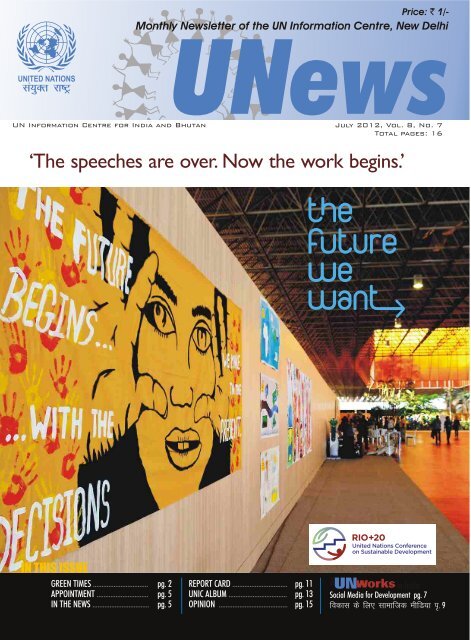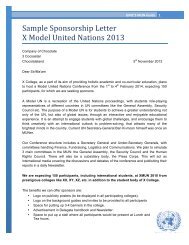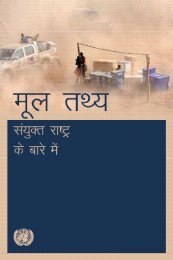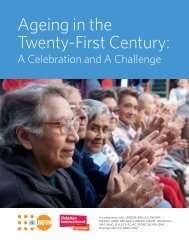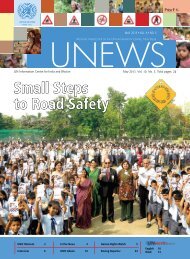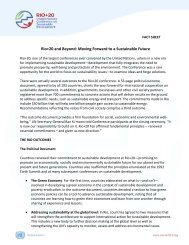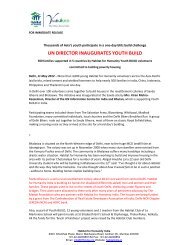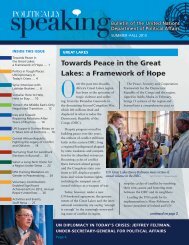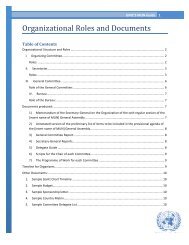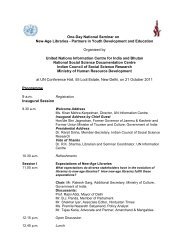Jul 2012, Vol:8, No. 7 - UNICs
Jul 2012, Vol:8, No. 7 - UNICs
Jul 2012, Vol:8, No. 7 - UNICs
- No tags were found...
Create successful ePaper yourself
Turn your PDF publications into a flip-book with our unique Google optimized e-Paper software.
UNewsMonthly Newsletter of the UN Information Centre, New DelhiGREEN TIMESThe ‘Zero Hunger Challenge’n the wake of the UN Conference onSustainable Development (Rio+20),Secretary-General Ban Ki-moon’s IHigh Level Task Force on Global FoodSecurity will be reoriented to focus on anew initiative as part of its efforts toensure a coherent UN system approachto the issue of food and nutritionsecurity.At Rio+20, in Rio de Janeiro, Brazil,Mr. Ban launched an initiative knownas the ‘Zero Hunger Challenge,’ whichinvites all countries to work for afuture where every individual hasadequate nutrition and where all foodsystems are resilient.The Task Force will be reoriented tofocus on the Challenge’s five objectivesas a guide for a coherent UN systemapproach to food and nutrition security.The Challenge’s five main objectivesare: achieving 100 per cent access toadequate food all year round; endingmalnutrition in pregnancy and earlychildhood; making all food systemssustainable; increasing growth in theproductivity and income ofsmallholders, particularly women; andachieving a zero rate of food waste.“The Secretary-General noted thatsince it was established in 2008, theTask Force had made progress indevising a common comprehensiveframework for action for the UNsystem in food and nutrition security,particularly during recent food crises,”Mr. Ban’s spokesperson said, followinga meeting of the Task Force onWednesday morning, which he chaired.He added that Mr. Ban noted that theTask Force had helped forge unitedpositions among its member agenciesat Rio+20 and at the Group of Eightand Group of 20 summits, and alsosupports the Committee on World FoodSecurity as the primary governancebody for food and nutrition.“But with close to one billion peoplestill experiencing chronic hunger, heurged agencies, governments,businesses, civil society organizationsand the scientific community toeliminate hunger in our lifetime,” thespokesperson added.Chaired by the Secretary-General, theTask Force brings together the heads ofthe UN agencies, funds andprogrammes, the World Bank, theInternational Monetary Fund, theOrganization for Economic Cooperationand Development and the World TradeOrganization (WTO) with the aim ofensuring that the UN system,international financial institutions andthe WTO are ready to provide robustand consistent support to countriesstruggling to cope with food insecurity.Photo: UNIC/S. Dhillon3
<strong>Jul</strong>y <strong>2012</strong>UNewsGREEN TIMESUN expert body calls on businesses torespect human rightsUnited Nations expert bodyhas expressed concern that theAoutcome document agreed atthe recent UN Conference onSustainable Development (Rio+20)failed to explicitly mention thatbusinesses must respect human rights.“Businesses will play a major role indeveloping the green economy andhuman rights safeguards are necessaryto ensure that policies and businessplans intended to advanceenvironmental or development goals donot negatively impact people,communities and their livelihoods,”said the head of the five-strong UNWorking Group on Human Rights andTransnational Corporations and OtherBusiness Enterprises, PuvanSelvanathan.“Inclusive, equitable and sustainabledevelopment can only become a realitywhen human beings are the centralconcern and their rights are realizedand respected,” Mr. Selvanathanstressed in a news release.Governments need to send clearmessages to companies on the respectof human rights as the world creates agreen economy, Mr. Selvanathanemphasized, adding that they shouldprovide them with access to effectiveremedies for those whose rights havebeen affected by business activities.More than 40,000 people – includingparliamentarians, mayors, UN officials,chief executive officers and civil societyleaders – attended Rio+20 from 20 to 22June.For her part, the UN SpecialRapporteur on the human right to safedrinking water and sanitation,Catarina de Albuquerque, welcomedthe explicit commitment toprogressively implement the right tosafe drinking water and sanitation in“The future we want iswithin reach – it is amatter of will, courageand vision by theworld's governments.”- Catarina de Albuquerque,UN Special Rapporteur on thehuman right to safe drinkingwater and sanitationthe Rio+20 outcome document.However, she warned that “progressiverealization” must not delay fullimplementation.“'Progressive realization of the right'requires States to take concrete stepsfor its full realization to the maximumof available resources, includingthrough international cooperation,” Ms.de Albuquerque said. “'Progressiverealization' is not an excuse to postponeimplementation, but rather calls forimmediate steps, as well as fordeveloping a roadmap to implement it.”Ms. de Albuquerque reaffirmed hercommitment to work with all Statesand stakeholders to developsustainable development and post-2015development goals for water andsanitation that ensure equality andnon-discrimination as well as otherhuman rights obligations.“The future we want is within reach – itis a matter of will, courage and visionby the world’s governments,” she stated.UN Photo/Eskinder DebebeThe Working Group called on Statesand business to work with it, civilsociety and other stakeholders, onensuring that the path to sustainabledevelopment set up at Rio+20 isundertaken, while protecting andrespecting human rights.UN Secretary-General Ban Ki-moon and Archbishop Emeritus Desmond Tutu at the WorldEconomic Forum meeting in Davos in January <strong>2012</strong>. Kenneth C. Frazier (standing), CEO ofMerck, also participated in the event, which highlighted the Every Woman, Every Childinitiative, spearheaded by Mr. Ban, to mobilize and intensify global action to improve thehealth of women and children around the world.4
UNewsMonthly Newsletter of the UN Information Centre, New DelhiAPPOINTMENTIndian to head UN Monitoring Force in Golan Heightsecretary-General Ban Ki-moonhas announced the appointmentSof Major General Iqbal SinghSingha of India as the head of theUnited Nations peacekeeping forcemonitoring the ceasefire in the GolanHeights between Israel and Syria.UN Photo/Wolfgang GrebienMajor General Singha will assume hisnew position as Head of Mission andForce Commander of the UNDisengagement Observer Force(UNDOF) in August, and will succeedMajor General Natalio C. Ecarma ofthe Philippines.In a statement issued by Mr. Ban'sspokesperson, the Secretary-Generalexpressed his gratitude to MajorGeneral Ecarma for “his dedication andeffective leadership of UNDOF over thepast two and a half years.”Major General Singha has extensivecommand experience and knowledge ofA vehicle of the United Nations Disengagement Observer Force (UNDOF) perchedabove the Golan Heights, near UNDOF's Camp Faouar, Syria.peacekeeping attained through serviceat national and international levels,the statement added. Prior to hisappointment, Major General Singhawas the General Officer of theCommanding Infantry Division, aposition he held since 2010. Hispeacekeeping experience includesserving with the now-closed UNMission in Eritrea and Ethiopia.IN THE NEWSUN mourns death of Indian peacekeeperxpressing concern over thesituation in the easternEDemocratic Republic of theCongo (DRC), Secretary-General BanKi-moon deeply regretted the death ofa United Nations peacekeeper killed ina recent armed clash there, hisspokesperson said on 6 <strong>Jul</strong>y.UN Photo/Sylvain LiechtiServing with the UN OrganizationStabilization Mission in DRC(MONUSCO), the Indian ‘blue helmet’had been in Bunagana, in the provinceof <strong>No</strong>rth Kivu, this week, when he wascaught in a cross-fire in clashes betweenthe DRC’s armed forces and a rebelgroup known as the M23.Indian peacekeepers with the UNmission in the Democratic Republicof the Congo (MONUSCO), deployedto the country’s <strong>No</strong>rth Kivu Province,stand guard over Bunagana and therebel stronghold of Runyonyi, asfighting continues between the M23splinter group and GovernmentFARDC forces.The DRC’s eastern provinces of <strong>No</strong>rthand South Kivu have witnessedincreased fighting betweenGovernment troops and the M23,which is composed of renegadesoldiers who mutinied in April and areled by Bosco Ntaganda. The fightinghas displaced more than 100,000people, including many who have fledto neighbouring Rwanda and Uganda.“The Secretary-General expresses hisserious concern about the situation ineastern DRC, and calls for animmediate end to all violenceperpetrated by armed groups,” Mr.Ban’s spokesperson said. He addedthat the Secretary-General extendshis condolences to the family of thevictim and to the Government andpeople of India.5
<strong>Jul</strong>y <strong>2012</strong>UNewsIN THE NEWSAfghanistan: SG calls for continued engagementpeaking at a major internationalconference on 8 <strong>Jul</strong>y, Secretary-SGeneral Ban Ki-moon called forthe international community tocontinue its engagement with andsupport for Afghanistan.“We must all continue to stand with thepeople of Afghanistan in their quest forsecurity, stability and prosperity. AnAfghanistan at peace with itself wouldat long last respond to its peoples’hopes of better lives for themselves andtheir children,” Mr. Ban said at theTokyo Conference on Afghanistan.“And an Afghanistan living in harmonywith its neighbours, near and far,would make a tremendous contributionto regional and international peace andsecurity,” he added.Hosted by the Government of Japan,the Tokyo Conference on Afghanistandrew representatives from 70 countries– including Afghan President HamidKarzai – and internationalorganizations to the Japanese capitalon Sunday to chart future assistancefor Afghanistan, ahead of thewithdrawal of foreign combat troops bythe end of 2014. The gathering was thethird international conference on theCentral Asian nation in three months.According to media reports, theConference’s participants agreed toprovide $16 billion in aid through 2015for Afghanistan’s economic anddevelopment sectors, with Japan aloneproviding $3 billion in aid through2016. The pledge came as Afghanistanreportedly agreed to new conditions todeal with endemic corruption.Syria: International pressure needed to preventescalation of violence“The situation [in Syria] hasdeteriorated significantly,and has become moremilitarized. Appalling violations ofhuman rights continue to take place.The killings and violence seem to havetaken on a very worrying sectariancharacter. At least 1.5 million peopleare now in need of urgenthumanitarian aid,” Mr. Ban toldjournalists at the Japan National PressClub on 8 <strong>Jul</strong>y.“It is crucial for the Security Counciland the Action Group to pressure theparties to prevent any furtherescalation of the conflict and advancethe prospects of a political transition,”he added.At its first meeting, held recently inGeneva, Switzerland, the Action Groupon Syria forged an agreement outliningthe steps for a peaceful transition inSyria, which included theestablishment of a transitionalgoverning body that would exercise fullexecutive powers and that would bemade up by members of the presentGovernment and the opposition andother groups.UN Photo/David ManyuaSmoke billows skyward as homes and buildings are shelled in the city of Homs, Syria, in June <strong>2012</strong>.6
UNewsMonthly Newsletter of the UN Information Centre, New DelhiSocial Media for DevelopmentHonour for UN knowledge management initiativeThe United Nations flagshipknowledge management initiative‘Solution Exchange’ was conferredthe eWorld Public Choice Awardunder the category ‘Best Initiative forLocalized Application/Content’ at theSecond eWorld Forum awardsceremony in New Delhi on 15 June.The award was presented by Mr. S.Regunathan, formerly Advisor,National Knowledge Commission,and Mr. Anil Srivastava, JointDirector-General, DirectorateGeneral of Civil Aviation (DGCA) &Chief Managing Director (CMD),Pawan Hans Helicopter Limited.Receiving the award Ms. FrederikaMeijer, UN Resident Coordinator a.i.said, “I am delighted to receive thisaward on behalf of the UN in India.Solution Exchange reaches out tothousands of developmentprofessionals who connect to applyFrederika Meijer (extreme left) receives the award from S. Regunathan(centre) and Anil Srivastava (right).their knowledge, experience, energy,and enthusiasm towards the commonobjective of problem solving and findinglasting solutions to development issues.”The award citation states: “Developedand managed by the UN in India since2005 the Solution Exchange (SE) is anICT enabled knowledge platform.Photo: UNRCO/Imran KokilooSolution Exchange occupies a uniqueniche in India’s development scene asit brings together large numbers ofdevelopment practitioners,researchers, policy makers andprivate sector organizations”.The Steering Committee of SolutionExchange is chaired by UNDP.WSP: Usingsoftware to address‘hard’ problemsAre we taking full advantage ofincreasingly ubiquitous mobile phonesand internet access to transforminclusion, citizen participation, andtransparency in water managementand services? Are we using open datato its full practical advantage? Insearch of answers, the World Bank'sWater and Sanitation Program hasembarked on a few projects one whichis detailed below. A full report can befound here:http://www.scribd.com/doc/97458967/Water-Hackathon-Lessons-LearnedThe 2011 Water Hackathon was thefirst-of-its-kind convening of softwaredevelopers to address real life water,sanitation, irrigation, flood and waterresource management challenges. In 10cities around the world, localtechnology specialists competed to findsolutions through mobile applicationsto water-sector challenges defined bygovernments, utilities, civil societygroups, World Bank experts, anddirectly by citizens.The Hackathon event was preceded byan iterative process of consultation,definition and refinement thatidentified significant challenges in thewater sector judged amendable totechnology solutions (or mobile apps).These issues were then reframed in away that allowed computerprogrammers – often unfamiliar withthe water sector – to understand andaddress them directly.What is a ‘Hackathon’? It is anintensive marathon competition ofbrainstorming and computerprogramming that draws together thetalent and creativity of softwaredevelopers and designers in a shortspan of time usually two hours. TheWater Hackathon had three plannedphases of activity:Phase 1 or the preparatory phasewhere a list of challenges facing thewater sector were collected and threemain venues identified for the event –Bangalore, Cairo and Nairobi7
<strong>Jul</strong>y <strong>2012</strong>UNewsImagePhase 2 or organization and executionof hackathon event – 10 hackathonsheld simultaneously in Bangalore,Cairo, Kampala, Lagos, Lima, London,Nairobi, Tel Aviv, Toronto, andWashington, D.C.Phase 3 is focused on dissemination ofthe best ranking applications and codesdeveloped with post event meet-upsand Government-hosted workshops.UNHCR: Socialmedia vital to gaugepublic attitudesThe UN Refugee Agency (UNHCR) hasa lively Facebook page, is on Twitter(@refugees), on Flickr(www.flickr.com/UNHCR) and onyoutube (www.youtube.com/UNHCR andwww.youtube.com/storytellingunhcr).The agency believes that social mediareaches out to a critical, wide anddiverse audience. Alexandra Eurdolian,based in UNHCR’s Public Affairs Unit,in Geneva says: “For an agency likeUNHCR, social media is vital in that ithelps you gauge the attitudes of yourconsumers and audience – to be intouch, and show the human side of yourorganization.This feedback and open line ofcommunication is fast and often veryhelpful for brands.”Campaigns launched on Facebook orTwitter have had a huge impact – morethan 1,224,872 people follow UNHCRon Twitter and the Facebook page hasalmost 160,000 “likes” This year, theWorld Refugee Day tag line was,“Conflict and violence have separatedmillions of refugees from their lovedones. 1 family torn apart by war is toomany. Our target audiences arevaried: socially minded people who arepredisposed to caring about socialissues, youth and those active on socialmedia who want to “giveback” something, influentialjournalists who write abouthumanitarian issues onlineand generate comment anddebate, stakeholdersincluding refugees, donorsand government. Socialmedia is an innovative wayof reaching out and UNHCRis using different platforms,including mobile phones, toraise awareness on refugeeissues.‘My Life as a Refugee’ is aninteractive role-playinggame that lets you discoverif you’ve got what it takesto survive as a refugee. Builtfor smart phones (iOS andAndroid), it entertains andeducates by letting playerswrestle with perilous dilemmas facedby millions of refugees worldwide. Thegame is a central element of UNHCR's<strong>2012</strong> ‘Dilemmas’ campaign, whichlaunched ahead of World Refugee Dayon June 20 and aims to build empathyand marshal public support around theprinciple that “1 family torn apart bywar is too many.” And it's easy to play.After selecting a character, playerscontemplate a series of tough decisionsand chance events in a quest to reachsafety, reunite with loved ones andrebuild their lives. Months or years ofnarrative are compressed into fivedaily episodes, creating tension andsuspense. Integration with Facebooklets players easily share theirexperience with friends.‘My Life as a Refugee’ presents real-lifedilemmas facing millions of refugees asthey flee war or persecution and striveto rebuild their lives. Along the way,players learn to appreciate the rights,needs and hopes of refugees and to seethem as resilient survivors. ‘My Life asa Refugee’ is geared mainly at 18-to 34-year-olds, who account for 52% ofmobile gamers and 69% of UNHCR’sFacebook reach. The game runs oniPhones, iPads and Androids in English.UNHCR/N.Bose8
asUNewsMonthly Newsletter of the UN Information Centre, New Delhifodkl ds fy, lkekftd ehfM;kla;qDr jk"Vª Kku izca/ku igy dk lEekul;a Dq r jk"Vª dh iez [q k Kku icz /a ku igy]lkYW ;'w ku ,Dlptas ] dks 15 tuw ubZ fnYyh ea svk;kfs tr nlw js boZ YMZ Qkjs e ijq Ldkj lekjkgs ea scLS V buhf'k,fVo QkjW ykdykbTM,Iyhd's kUl@dVa Us Vl~ ] J.s kh ea s ^boZ YMZ ifCydPokbl ijq Ldkj* fn, x,A;g iqjLdkj Jh ,l- j?kqukFku] iwoZ lykgdkj]jk"Vªh; Kku vk;ksx vkSj Jh vfuy JhokLro]la;qDr egkfuns'kd] ukxj foekuuegkfuns'kky; ¼Mhthlh,½ vkSj eq[; izca/kfuns'kd ¼lh,eMh½] iou gal gsyhdkWIVjfyfeVsM] us iznku fd;kAiqjLdkj xzg.k djrs gq, lqJh ÝsMsfjdk esbt+j];w,u jsthMsaV dkWfMZusVj] ,-vkbZ- us dgk fd]^^Hkkjr esa la;qDr jk"Vª dh vksj ls ;g iqjLdkjxzg.k djrs gq, eq>s cgqr [kq'kh gks jgh gSAlkWY;w'ku ,Dlpsat fodkl ls tqM+s mu gtkjksais'ksoj yksxksa rd igqaprk gS tks vius Kku]vuqHko] ÅtkZ vkSj mRlkg dk mi;ksx fodkllaca/kh eqíksa dk LFkk;h lek/kku [kkstus vkSjleL;k,a lqy>kus ds fy, djrs gSaA**iqjLdkj ds iz'kfLr i= esa dgk x;k gS% ^^Hkkjr esa 2005 ls la;qDr jk"Vª }kjk fodflrvkSj pykbZ tk jgh lkWY;w'ku ,Dlpsat igy,d vkbZlhVh lfØ; Kku eap gSA Hkkjr dsfodkl ifjn`'; esa lkWY;w'ku ,Dlpsat dk ,dfo'ks"k LFkku gS] D;ksafd cM+h la[;k esa fodkldfeZ;ksa] 'kks/kdrkZvksa] uhfr cukus okyksa vkSjfuth {ks= ds laxBuksa dks ,dtqV fd;k gSA**MCY;w,lih%eqf'dyksa dk lek/kkulkWVos;j lsD;k ge ty izc/ a ku vkSj lo s kvkas eas ikjnf'kZrkykus vkSj ukxfjdkas dh Hkkxhnkjh rFkk leko's kuds rkSj rjhds cnyus ds fy, ekc s kby Qku s vkSjbV a juV s ds cldsa vkSj lh/ks lqy>k ldsaAgSdkFkkWu D;k gS\ ;s fnekxhdljr vkSj dEI;wVj izksxzkedh t+cnZLr izfr;ksfxrk gS]ftlesa lkWVojs;j Msoyidjus okyksa vkSj fMtkbulZdh izfrHkk vkSj jpukRedrkdh vke rkSj ij nks ?kaVs dsHkhrj ijh{kk gksrh gSA okWVjgSdkFkkWu dks rhu pj.kksa esapyk;k x;k%pj.k 1 ;k rS;kjh dk pj.k]ftlesa ty {ks= dh pqukSfr;ksa dh lwph rS;kj dhxbZ vkSj bl vk;kstu ds fy, rhu izeq[k “kgjksacaxywj] dkfgjk vkSj uSjksch dks pquk x;kApj.k 2 ;k gSdkFkkWu dk vk;kstu vkSj lapkyu&caxywj] dkfgjk] dEikyk] ykvksl] yhek] yanu]uSjksch] rsy voho] VksjaVks vkSj okf'kaxVu Mhlh esa,d lkFk 10 gSdkFkkWu vk;ksftr fd, x,Apj.k 3 esa gSdkFkkWu esa fodflr loksZŸke,Iyhds'kUl vkSj dksM~l ds izlkj ds fy,lEesyuksa vkSj ljdkj dh estckuh esadk;Z'kkykvksa dk vk;kstu fd;k tk jgk gSA9
<strong>Jul</strong>y <strong>2012</strong>UNews;w,u,plhvkj%turk dk :[k Hkk¡ius esalks'ky ehfM;k dh vgeHkwfedkLak;qDr jk"Vª 'kj.kkFkhZ ,tsalh ¼;w,u,plhvkj½ dkviuk Qslcqd ist gS] ;g fV~oVj (@refugees)ij] fydj (www.flickr.com/UNHCR)vkSj ;wV~;wc (www.youtube.com/UNHCR vkSjwww.youtube.com/storytellingunhcr)ij Hkh ekStwn gSA ,tsalh dk ekuuk gS fd lks'kyehfM;k egRoiw.kZ] O;kid vkSj fofo/k izdkj dsyksxksa rd igqaprk gSA ftusok esa ;w,u,plhvkjdh yksd dk;Z bdkbZ esa ,ysXtsaMjk ;wjnksfy;udk dguk gS fd]^^;w,u,plhvkj tSlh ,tsalh dsfy, lks'ky ehfM;k] blfy, egRoiw.kZ gS fd ;sgekjs miHkksDrkvksa vkSj yksxksa dk :[k Hkk¡ius]muds lEidZ esa jgus rFkk vius laxBu dkekuoh; psgjk fn[kkus esa enn djrk gSA mulsjk; vkSj [kqys laokn dk vknku&iznku rst+h lsgksrk gS vkSj vdlj czkaM~l ds fy, cgqrennxkj lkfcr gksrk gSA**Qslcqd ;k fV~oVj ij tks Hkh vfHk;ku 'kq: fd,x, mudk t+cnZLr vlj iM+k gSA 1]224]872 lsvf/kd yksx fV~oVj ij ;w,u,plhvkj ds lans'kns[krs gSa vkSj Qslcqd ist dks djhc 1]60]000yksxksa us ilUn fd;k gSA bl o"kZ fo'o 'kj.kkFkhZfnol dk lans'k Fkk] ^^la?k"kZ vkSj fgalk us yk[kksa'kj.kkfFkZ;ksa dks muds fiz;tuksa ls vyx fd;k gSA;q) esa fcNM+k 1 ifjokj cgqrksa ds cjkcj gSA**gekjk lans'k fofo/k lewgksa ij yf{kr Fkk%lkekftd n`f"V ls tkx:d O;fDr tks igys lslkekftd eqíksa ij /;ku nsrs gSa] ;qok vkSj lks'kyehfM;k ij lfØ; os O;fDr tks lekt dks dqNykSVkuk pkgrs gSa] izHkko'kkyh i=dkj tksvkWuykbu ekuoh; eqíksa ij fy[krs gSa] izfrfØ;kvkSj cgl NsM+rs gSa] 'kj.kkFkhZ] nkrk vkSj ljdkjsaAlks'ky ehfM;k yksxksa rd igqapus dk ,d fujkykrjhdk gS vkSj ;w,u,plhvkj 'kj.kkFkhZ eqíksa dsckjs esa tkx:drk crs gSa ftudk lkeuknqfu;k ds yk[kksa'kj.kkfFkZ;ksa dks djukiM+rk gSA ;w,u,plhvkjus 20 twu dks fo'o'kj.kkFkhZ fnol ls igysMk;ySekt+ vfHk;ku<strong>2012</strong> 'kq: fd;k FkkA ;gxse mldk izeq[k vax gSAbldk mís';] ^^;q) esafcNM+k ,d ifjokj cgqrksads cjkcj gS** fl)kUr ijtu leFkZu tqVkuk vkSjln~Hkkouk fodflr djukgSA bls [ksyuk vklkugSA fdlh ,d fdjnkjdks pquus ds ckn f[kykM+hlqj{kk ikus] vius fiz;tuksals fQj feyus vkSj viukthou fQj [kM+k djus dsfy, vusd dM+s QSlysysrs gSa vkSj la;ksx pqursgSaA eghuksa ;k o"kkZsa ds vuqHkoksa dks ikap nSfuddfM+;ksa esa lesVk x;k gS ftuesa ruko vkSj lLisallc dqN gSA Qslcqd ls tqM+k gksus ds dkj.kf[kykM+h vius vuqHko fe=ksa ds lkFk vklkuh lsck¡V ldrs gSaAekbZ ykbQ ,t , fj;wth ;q) ;k lagkj ls Hkkxdj viuk thou nksckjk laokjus esa tqVs yk[kksa'kj.kkfFkZ;ksa ds lkeus ekStwn nqfo/kkvksa dk [ksygSA bl xse ds nkSjku f[kykM+h] 'kj.kkfFkZ;ksa dsvf/kdkjksa] vko';drkvksa vkSj vk'kkvksa dksle>us yxrs gSa vkSj mUgsa tq>k# fotsrk ekuusyxrs gSaA bl xse esa rhu eq[; fdjnkj gSa] tksfoLFkkfir gSa vkSj ifjokj ls fcNM+ x, gSaA ;gxse geus ewy :i ls vke eksckby xsej dks/;ku esa j[k dj rS;kj fd;k gSA 28 o"kZ dhi
UNewsMonthly Newsletter of the UN Information Centre, New DelhiREPORT CARDUNIC launches <strong>2012</strong> Report on MDGsPhotos: UNIC/S. Dhillon(l-r): Rajiv Chandran, National Information Officer, UN Information Centre; Frederika Meijer,UN Resident Coordinator a.i.; and Prof. Jayati Ghosh, Jawaharlal Nehru University.NIC organized the medialaunch of the UN Secretary-UGeneral’s MillenniumDevelopment Goals Report <strong>2012</strong> in NewDelhi on 2 <strong>Jul</strong>y.In his foreword to the Report, UNSecretary-General Ban Ki-moon saysthat further success depends onfulfilling MDG-8 – the globalpartnership for development. “Thecurrent economic crises besetting muchof the developed world must not beallowed to decelerate or reverse theprogress that has been made. Let usbuild on the successes we have achievedso far, and let us not relent until all theMDGs have been attained”, he adds.While bullish on the success recorded,the MDG Report warns that the 2015deadline is fast approaching and inorder to achieve outstanding goals,Governments, the internationalcommunity, civil society and theprivate sector need to intensify theircontributions.Gender inequality persists and womencontinue to face discrimination inaccess to education, work and economicassets, and participation ingovernment. Violence against womencontinues to undermine efforts to reachall goals. Further progress to 2015 andbeyond will largely depend on successon these interrelated challenges.http://www.un.org/millenniumgoals/WIR <strong>2012</strong>: FDI prospects fraught with uncertaintiesNIC launched UNCTAD’sflagship World InvestmentUReport in New Delhi on 5 <strong>Jul</strong>y.In his welcome address, UNIC NationalInformation Officer Rajiv Chandranquoted the UN Secretary-General’sforeword to the Report where he said:“Prospects for foreign direct investment(FDI) continue to be fraught with risksand uncertainties. A broaderdevelopment policy agenda is emergingthat has inclusive and sustainabledevelopment goals at its core. Forinvestment policy, this new paradigmposes specific challenges. At the nationallevel they include integrating investmentpolicy into development strategy,incorporating sustainable developmentobjectives, and ensuring relevance andeffectiveness. At the international levelit is necessary to strengthen the11
<strong>Jul</strong>y <strong>2012</strong>UNewsREPORT CARDPhotos: UNIC/S. Dhilloncontinued to be the third most popularFDI destination on the globe, and hadwitnessed a 33% growth in FDI flowsover the previous year.http://www.unctad-docs.org/files/UNCTAD-WIR<strong>2012</strong>-Full-en.pdfdevelopment dimension of internationalinvestment agreements, manage theircomplexity, and balance the rights andobligations of States and investors.”Prof. Nagesh Kumar, ChiefEconomist, UN-ESCAP (UN Economicand Social Commission for Asia and thePacific) who is also concurrentlyDirector of ESCAP’s Sub-Regional office,made a detailed presentation of the WIRto the media. Dr. Kumar highlighted theimpact of FDI on India and the SouthAsian region. He mentioned that IndiaWorld Economic and Social Survey <strong>2012</strong>NIC New Delhi organized themedia launch of the <strong>2012</strong>UWorld Economic and SocialSurvey on 6 <strong>Jul</strong>y.In this annual report on globaldevelopment, the UN says, in the midstof difficult financial times, many donorcountries have cut back on developmentassistance. In 2011, for the first time inmany years, aid flows declined in realterms. The Survey finds that thefinancial needs of developing countrieshave long outstrippedthe willingness andability of donors toprovide aid. Andfinding the necessaryresources to achievethe MillenniumDevelopment Goalsand meet other globalchallenges, such asaddressing climatechange, will be tough,especially for least developed countries.Introducing the Report, UNIC NationalInformation Officer Rajiv Chandransaid that this year’s WESS underlinesthe UN’s key role in flagging issuesthat will be debated by all countries ofthe globe in the near future.Prof Nagesh Kumar, ChiefEconomist, UN-ESCAP (UN Economicand Social Commission for Asia andthe Pacific), and also Director ofESCAP’s Sub-Regional office, explainedthe innovative strategies outlined inthe WESS including new creative taxesthat would be additional, stable andpredictable, and which could especiallybenefit the developing and leastdeveloped countries.http://www.un.org/en/development/desa/policy/wess/index.shtmlPhotos: UNIC/S. Dhillon12
UNewsMonthly Newsletter of the UN Information Centre, New DelhiUNIC ALBUMCelebrating World Environment Day in the Himalayashimla, popularly known as Queenof the Hills, the capital of themountain state of Himachal SPradesh, was the venue of theHimachal Pradesh United NationsAssociation’s (HPUNA) event tocelebrate World Environment Day,together with the Indian Federation ofUnited Nations Associations (IFUNA)and UNIC. The guests includedhistorians, environmentalists,academicians, poets, writers, membersof the State Government, the judiciary,and the media.known author; and SanjeevaPandey who presented anoverview of the flora and faunaof the region.UNIC Director Kiran Mehra-Kerpelman was the ChiefGuest and commended thepeople and authorities of theState for the work that theyhad been doing to protect theenvironment. She presentedexcerpts from the message ofthe UN Secretary-General andgave a background on Rio+20and its 7 pillars. She alsosuggested that in the context ofthis meeting, HPUNA and theGovernment might togetherththink about establishing an 8pillar locally: Management ofMountain Resources. This ideawas later taken up by SagarAhluwalia, Secretary-GeneralPATWA, who suggested that this beShimla Mayor Sanjay Chauhan (left) andUNIC Director Kiran Mehra-Kerpelman(right) light the ceremonial lamp.Several interesting presentations weremade by eminent personalities,including by the recently elected Mayorof Shimla, Sanjay Chauhan;Chander Mahajan, PresidentHPUNA and Vice President IFUNA;Suresh Srivastava, Secretary GeneralIFUNA; Dr. Purnima Chauhan of theHimachal Administration; RaajaBhasin, HPUNA Secretary and a wellgivenserious consideration, and aninstitute on environmental issues beformed in the State as a pilot.International Day in Support of Victims of TortureNIC New Delhi joined forceswith the Office of theUEuropean Union Delegation toIndia (EU) to mark International Dayin Support of Victims of Torture.Addressing the gathering, India’sUnion Minister for Law and JusticeSalman Khursheed reiterated thecommitment of the Government ofIndia to eradicating torture. WajahatHabibullah, Chairman of India’sNational Commission for Minorities,said that only police reforms could helperase the practice of torture as meansof extracting confessions from accusedpersons in custody and as a mode of'punishment’. Member of ParliamentE.M.S. Natchaiappan, who was amember of the Parliamentary SelectCommittee that examined thePrevention of Torture Bill, enlightenedthe audience on the variousamendments the Committee hadsuggested to make the Bill moreeffective. Justice Ajit Shah, formerchief Justice of the Delhi High Courtand currently member of the Board ofThe Commonwealth Human RightsInitiative, quoted several SupremeCourtjudgements thathad helpedcreate a cultureof rights againstthe use oftorture.Opening theobservance,AmbassadorJoao Cravinhoof the EuropeanUnionhighlighted the EU’s commitment tofighting torture and also helping provideredressal and compensation to victims.UNIC National Information OfficerRajiv Chandran emphasized thattorture is a crime under internationallaw. He also delivered the Secretary-General’s message for the Day.13
<strong>Jul</strong>y <strong>2012</strong>UNewsUNIC ALBUMUNIC leads first World Elder Abuse Prevention Dayobservance in New DelhiPhoto: UNIC/S. Dhillonn New Delhi, marking the first-everobservance of World Elder AbuseIAwareness Day, the UNInformation Centre brought togetherseveral partners – the Asia Chapter ofthe International Network forPrevention of Elder Abuse (INPEA);United Nations Population Fund(UNFPA); and NGO Development,Welfare and Research Foundation(DWRF) – in a workshop thathighlighted Inter-Generational Bonding.UNIC’s workshop attempted to narrowdown the growing divide by placingageing in a life-course perspective,analyzing relations betweengenerations as part of a process thatcould be enhanced with additionalMaking senior citizens aware of their rightsawareness of age sensitivity.Speakers at the seminar included:Ms. Frederika Meijer, UN ResidentCoordinator, a.i. and Representative,UNFPA India & Bhutan; Dr. SavitaMohan Datta, Principal, MaitreyiCollege and Director, School of OpenLearning, Delhi University; Prof C. RajKumar, Vice Chancellor, O.P. JindalGlobal University; youth programmecoordinator Akash Kapur; andDr. Mala Kapur Shankardass,INPEA Asia Chair and ManagingTrustee of NGO DWRF.UNIC National Information OfficerRajiv Chandran delivered theopening address highlighting the issueof elder abuse in India. He alsodelivered the UN Secretary-General’smessage for the Day.t a discussion to mark the firstever World Elder AbuseAAwareness Day (15 June),senior citizens interacted with officialscharged with safeguarding their rightsand came away with some usefulpointers.Dr. Aabha Chaudhary, chairpersonof Anugraha, UNIC’s partnerorganisation that works for the rightsof the elderly, began with an audiovisualpresentation of some of theproblems faced by the elderly. AnoopKumar Srivastava, AdditionalSecretary in the Ministry of SocialJustice and Empowerment,Government of India, informed theaudience that under the Maintenanceand Welfare of Parents and SeniorCitizens Act, 2007, the elderly areentitled to need-based maintenancefrom their children. The audience alsoheard from Dr. Kirti Suri Verma, aMaintenance Tribunal member, whogave examples of the issues tackled bythe Tribunal and urged the seniorcitizens present to be aware of theirrights. Deputy Commissioner of PoliceAjay Chaudhry, who was also presenton the occasion, highlighted the role ofthe Delhi Police in safeguarding seniorcitizens. UNIC Assistant InformationOfficer Rineeta Naik welcomed theparticipants and also presented themessage of UN Secretary-General BanKi-moon on World Elder AbuseAwareness Day. “As a society, we havealways had much to say about how werespect our elders and how we valuetheir experience and wisdom,”Ms. Naik said. “We must build ahuman rights framework upon thecivilizational values that we socherish,” she added.Photo: UNIC/S. Dhillon14
UNewsMonthly Newsletter of the UN Information Centre, New DelhiOPINIONThink young to fast track population developmentFrederika MeijerIndia is set to overtake China as theworld's most populous country, in lessthan one and a half decades. Itspopulation growth rate of 1.6% is almostdouble that of China’s. As a result, everysixth person in the world is an Indian.India’s population is more than thepopulation of USA, Brazil, Bangladesh,Pakistan, Indonesia and Japan puttogether. As India contributes thelargest share to world population, itspeople’s economic, social and healthstatus will have a greater global impact.At the same time, India’s population ofover 1.2 billion has its largest evershare of young people. It is the world’syoungest nation, with the world’slargest young population entering theirreproductive years. Imagine thepossibilities of demographic change theyouth could bring about with theirchoices, especially their reproductivehealth choices. Whether India meets itspopulation stabilisation goal by 2045will depend critically on the fertilitychoices its young people make. Do theyhave access to appropriate healthinformation and resources to make theright decisions?Population stabilisation is necessaryfor sustainable development.Population planning witnessed aparadigm shift with the 1994International Conference on Populationand Development, moving away frompursuing demographic targets orsimply numbers, to fulfilling youngpeople’s reproductive health needs. Yet,a latest UN report shows little progresshas been made in fulfilling the unmetneed for family planning in thedeveloping world. At the Rio+20 UNConference held in June, governmentshave adopted a consensus recognisingthe importance of young people’sreproductive rights for sustainability.In India’s case, the need is urgent as itsyouth population puts reproductiveWhen a woman can plan her family, she can plan the rest of her life.health centre stage and promises toinfluence other development goals.Meeting young people’s family planningneeds remains an unfinisheddevelopment agenda. In the prime ofreproductive age, young people needcontraceptives the most to plan theirfamilies and achieve reproductive health.Almost half of young girls in India aremarried before they are 18. One in 6teenage girls becomes a mother. Whenyoung women have children too soon,too many and too close to each other,the consequences are grim. Anadolescent woman carries twice therisk of dying in childbirth than awoman in her 20s. One in 4 youngwomen 15 to 24 years old dies duringchildbirth in India.Even though, India has madesubstantial strides in bringing down thematernal mortality ratio, it stillcontributes the highest share of globalmaternal mortality. A recent WorldBank, UNFPA, WHO report (<strong>2012</strong>)shows that India contributes 20% ofmaternal deaths worldwide, even as thenumber of maternal deaths globally hashalved. Contraceptive use, especiallyspacing between births saves women’slives, and a majority of maternal deathsin India are preventable.East Asia has improved the health ofits young mothers by expandingcontraceptive use to 84% women. Incontrast, just over half of women inIndia use contraceptives.While India was among the first to havea family planning policy, thousands ofunintended pregnancies continue totake place every year. Women do nothave access to contraceptives to avoidunplanned and mistimed pregnancies.Over 1 in 4 young women reports ademand for reversible contraceptives toplan their families.The family planning policy’s focus onsterilisation is evident in the fact thatfemale sterilisation accounts for twothirdsof all contraceptive use in India,almost unchanged since 1993 when thefigure was 67%. The over reliance onsterilisation has meant the publichealth system has not given couples achoice of reversible contraceptives toplan or space their children. Researchhas shown repeatedly that not enoughmen and women have completeinformation on contraceptive choice.Policies on the ground need to clearlyshift toward reversible methods ofcontraception. Couples need choice andinformation on what’s available tomake their own decisions.Photo: UNIC/S. Dhillon15
<strong>Jul</strong>y <strong>2012</strong>Regd. <strong>No</strong>. DELBIL/2005/15087DL(S)-17/3076/2011-13OPINIONGreater access to contraceptives willgive women the means to plan theirfamilies. Research shows a majority ofcouples in India, especially those whoare uneducated and live in rural areas,do not decide mutually when to havechildren or how many to have. Mostoften, it’s the men who make decisions.Easy access to information and serviceswould empower women to plan theirfamily. Many countries have increasedcontraceptive use by giving women anexpanded choice of contraceptives thatallow women control over theirfertility, and greater power ofnegotiation in relationships. At a timewhen almost half of women in Indiabelieve wife beating is justified,according to the National FamilyHealth Survey (NFHS 3),contraceptives have to be easy to get.When a woman can plan her family,she can plan the rest of her life. Longterm, policies to achieve genderequality could script the success offamily planning in India.At the same time, if men are thedecision-makers, men must beintegrated in family planning efforts.Mostly, women undergo sterilisation,while male sterilisation, with thewidely available NSV, is a far easieroption. The good news is, men havesaid in surveys, that family planning isnot the sole responsibility of theirwives. There is a real need to factor theneeds of men in research for moreinformed policies, and to encouragemen’s participation in choosing –healthier families.Education of girls is linked to thesuccess of family planning measures,and in achieving populationstabilisation. Figures show thateducated men and women in Indiamarry later and have fewer children.Premarital sex among young people inIndia is rising and we also know thatthe age at which the young are sexuallyactive is lowering, as a 2006-2007study by IIPS-Population Councilshows. The need for a comprehensivesexuality education is greater thanever before. Sexuality education is nota tacit permission to engage in sex. Infact, young boys and girls lack access tocorrect information on sexual health.As a result, teenagers say they rely oninformation from the internet,magazines, even pornography andtalking to peers. That’s why thousandsof underage girls suffer unintendedpregnancies and unsafe abortions; andyoung people just don’t know enoughabout protecting themselves frominfections such as HIV.There is little data on the needs ofunmarried young women and men andtheir use of contraceptives. A swellingyoung population demands that theirneeds be mainstreamed into nationalpolicy making.If women in India were having thenumber of children they wanted, theaverage number of children per womanwould be 1.9, compared to the currentfigure of 2.7, according to the NFHS 3.A majority of married couples dependon public health for their familyplanning needs. Progress in fulfillingthe reproductive health needs of youngpeople, married and unmarried,requires closing gaps in infrastructure,skilled health workers, quality ofservices and supplies.A recent Lancet report says thatIndia's national goals cannot beachieved without greatly expandingpublic spending in healthcare. India’spublic health spend is among thelowest in a global average of 6% GDPspent on healthcare. In 2005, India’spublic health spend per person was22% of Sri Lanka’s, 16% of China’s, andless than 10% of Thailand’s. Poorpeople, who need health care the most,have to turn to private healthcare thatthey can barely afford.The return on investing in youngpeople's health makes economic sense.A UNFPA- Guttmacher Institutereport shows that an additional $4billion dollars is needed to fulfil theunmet contraceptive need indeveloping countries, but that wouldsave $5.7 billion dollars in maternaland child health services costs, or $1.4for every dollar spent.While health needs are facing ashortfall of donor funding globally,India, with recent economic progress, isin a unique position to leverage privatefinancing and create partnerships todeliver quality health services. At thesame time, it’s not simply aboutinvestment. Efficiency of expenditure,monitoring of service delivery andgovernance determine if people get thehealth care they need.On World Population Day (11 <strong>Jul</strong>y),world leaders gathered at the LondonInternational Family PlanningSummit, organised by the UKgovernment and Bill and MelindaGates Foundation, chaired by UNFPAto discuss a real and urgent need forfunding to meet family planning needs.I hope governments, including India,would deepen their commitment todelivering a world where everypregnancy is wanted, every childbirthis safe, and every young person’spotential is fulfilled.Frederika Meijer is the UNFPACountry Representative for India andBhutanReproduction of material from this newsletter is encouraged; please credit UNews.For more information on UN activities, link to: UN web site: www.un.org UNIC web site: www.unic.org.inPrinted at Modest Graphics Pvt Ltd, C-53, DDA Sheds, Okhla Ind Area, Phase I, New Delhi, for United Nations Information Centre, 55 Lodi Estate, New Delhi 03


